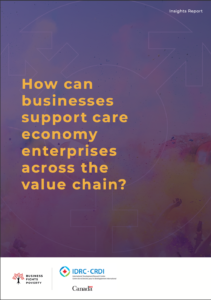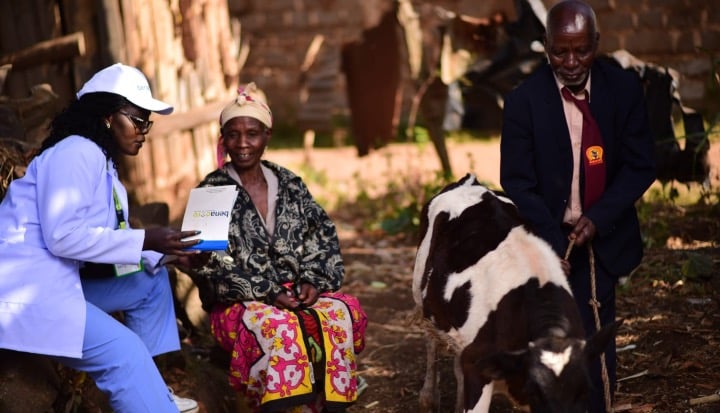A new Business Fights Poverty report illustrates that opportunities exist across the value chain for business to play a key role in supporting social innovation in this area and become co-responsible care actors.

What is care?
The global economic system is underpinned by many thousands of hours of “invisible” care work that is often unpaid, underpaid or undervalued. The employees’ homes and offices need cleaning; breakfasts, lunches and dinners need to be provided; and employees and workers in supply chains, need care for their loved ones in order to go to work, be they children, elderly parents or disabled family members.
Globally, women perform 75% of such work, dedicating, on average, 4 hours and 25 minutes daily to it – more than three times men’s average of 1 hour and 23 minutes. The amount of unpaid care and domestic work undertaken by women peaks during the working ages of 25–44 years. It is arguably one of the most fundamental reasons why achieving gender equality in labour markets and in the workplace remains elusive. Those that are paid to undertake domestic and care work are among the most vulnerable groups of workers. Of the 67 million domestic workers in the world, over 80% are estimated to be women. They work in private households, often with no rights or employment contracts.
Demand for care is growing
As 2XGlobal has noted, ageing populations, displacement and health issues stemming from climate change, changing family structures and care needs, and increased care dependency ratios, combined with increased levels of women’s employment in certain countries, have -deepened the care crisis, which was made evident during the COVID-19 Pandemic. The number of care recipients is projected to reach 2.3 billion by 2030, a 10% increase from 2015.
This demand is increasing the urgency for public investment. It is also furthering the business case for action. Addressing the care economy can assist with recruitment and retention (companies are judged by employees on their ability to provide family friendly policies). Regulatory requirements are changing (e.g. factories of more than 50 employees are required to provide creches in many countries). Care related risks are becoming recognised – including for example the relationship to child labour in supply chains.
Innovators are helping fill the gap
Despite the growing demand for care services by employees and workers, public and private provision remains underfunded and fragmented. Whilst greater public investment is urgently required, innovative social entrepreneurs focussing on the care economy are seeking to address this gap, but they require investment and support from companies and investors to reach the necessary scale.
The IDRC supported Care Economy Knowledge Hub has mapped 165 such enterprises operating across Latin America, Asia and Africa. Organisations like:
- Homely is a digital platform that connects clients with a trusted cleaning professional for their home or office more easily, quickly and securely. It focuses on rewarding care, professionalising care work, elevating careworkers rights, and making care jobs decent jobs.
- Folia Water: Folia Water Global Inc. provides affordable and effective water filtration solutions to low-income communities that lack access to clean drinking water. It helps to reduce drudgery.
- AgeWatch Africa Foundation provides high-quality care to the elderly in rural Kenya.
- AEioTU partners with public and private actors to provide comprehensive, high-quality care to children from 0 to five years of age, reducing women’s time dedicated to caregiving activities.
Business can become co-responsible actors
Global corporations recognise the benefits of collaborating with both SMEs and social enterprises. The former are often essential actors in the supply chain – distributors, retailers, smallholder farmers; and the latter can help deliver local solutions for complex challenges, have a higher risk tolerance, and can reach new customer bases or demographics. An MNC can offer scale, financing and be a test-bed to trial new innovations in their supply chains or with their existing customer bases.
However very few have yet spotted the opportunity to work with care enterprises. The new Business Fights Poverty report explored how this could change. Interviews were undertaken with 5 global corporations which provided four overarching insights.
- Companies need to better understand how care impacts their core business and how their core business impacts care needs (often initiatives are happening unintentionally and the links to care are not understood)
- Workplace policies offer a springboard to engage with care enterprises (Procurement and HR departments could hire the services of care enterprises to help employees e.g. responsible recruitment of domestic workers, responsible sourcing of cleaning services)
- Companies with extensive supply chains could help enterprises achieve scale (companies can be a bridge essentially linking their workers with social enterprises to help them access low cost, quality care services)
- Philanthropic entrepreneurship programmes could be more focussed on care enterprises. (Many MNCs have large programmes but none intentionally support care enterprises)
It is hoped that the Framework for Action included in the report and the Directory of care enterprises provides a launch-pad for further business engagement with care enterprises. Engaging with care economy social enterprises is part of a broader call to action for businesses to become co-responsible care actors. Achieving progress in the care economy will help accelerate progress for SDG 5 (and others). We need action from everyone to create the caring society we all need to survive and thrive.
For more information and to access the framework please click on the report here.










